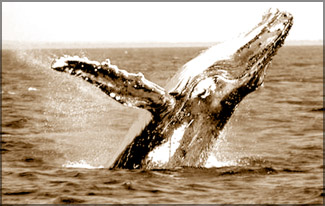
Australian scientists decode whale sounds
Australian scientists
studying humpback whale sounds say they have begun to decode the whale's
mysterious communication system, identifying male pick-up lines and
motherly warnings.
Wops, thwops, grumbles and squeaks are part of the extensive whale
repertoire(collection) recorded by scientists from the University of
Queensland working on the Humpback Whale Acoustic Research Collaboration
(HARC) project.
Recording whale sounds over a three-year period, scientists
discovered at least 34 different types of whale
|

A humpback whale. |
calls, with data published in the Journal of the Acoustical
Society of America.
"I was expecting to find maybe 10 different social vocalizations, but
in actual fact found 34. It's just such a wide, varied repertoire,"
University of Queensland researcher Rebecca Dunlop told Reuters.
The researchers studied migrating east humpback whales, as they
travelled up and down Australia's east coast, and recorded 660 sounds
from 61 different groups.
Researchers attached audio transmitters to buoys near the whales and
monitored the whale interaction from the shore.
Many of the whale sounds could overlap in meaning, said Dunlop, but
some had clear meanings. A purr by males appeared to signify the male
was trying his luck to mate a desirable female. High frequency cries and
screams were associated with disagreements, when males jostled to escort
females during migration, she said.
A wop sound was common when mothers were together with their young.
"The wop was probably one of the most common sounds I heard, probably
signifying a mum - calf contact call," said Dunlop.
Dunlop stopped short of defining the whale communication as a
language, but said there were clear similarities with, human
interaction.
"It's quite fascinating that they're obviously marine mammals,
they've been separated from terrestrial mammals for a long, long, long
time, but yet still seem to be following the same basic communication
system," she said.
Dunlop hopes further research on the subject will help reveal the
effect of boats and man-induced sonar on migrating whales.
Reuters |
